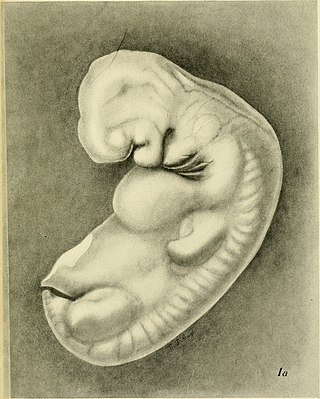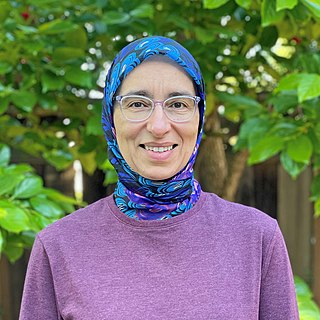Margaret Stratford Livingstone is the Takeda Professor of Neurobiology in the Department of Neurobiology at Harvard Medical School in the field of visual perception. She authored the book Vision and Art: The Biology of Seeing. She was elected a member of the American Academy of Arts and Sciences in 2015 and was elected to the National Academy of Sciences in 2020.

All India Institute of Medical Sciences, New Delhi, also known as AIIMS Delhi, is a public medical research university and hospital in New Delhi, India. The institute is governed by the AIIMS Act, 1956 and operates autonomously under the Ministry of Health and Family Welfare.
Michael S. Kaplan is an American biology researcher, medical professor, and clinical physician. A pioneer of neurogenesis research, his work refuted the classic idea that no new nerve cells are born in the adult mammalian brain. His research using light and electron microscopy suggested that neurogenesis occurs in the brain of adult mammals, but his findings were rejected by the scientific community at the time in a field that continues to be contentious. Doctor Kaplan has recently begun a YouTube channel which offers patient interviews and insights to brain plasticity; kaplan brain health, YouTube.

John E. Heuser is an American Professor of Biophysics in the department of Cell Biology and Physiology at the Washington University School of Medicine as well as a Professor at the Institute for Integrated Cell-Material Sciences (iCeMS) at Kyoto University.
Christine Elizabeth Holt FRS, FMedSci is a British developmental neuroscientist.
Clara Franzini-Armstrong is an Italian-born American electron microscopist, and Professor Emeritus of Cell and Developmental Biology at University of Pennsylvania.
Mahdi Hasan was an anatomist from Uttar Pradesh, India.

June Dalziel Almeida was a Scottish virologist, a pioneer in virus imaging, identification, and diagnosis. Her skills in electron microscopy earned her an international reputation.
Indira Nath was an Indian immunologist. Her major contribution in medical science deals with mechanisms underlying immune unresponsiveness in man, reactions and nerve damage in leprosy and a search for markers for viability of the Leprosy bacillus. Prof. Nath's fields of specialisations are Immunology, Pathology, Medical biotechnology, and communicable diseases.

János Szentágothai FRS was a Kossuth Prize-winning Hungarian anatomist, Professor, Member of Parliament, and President of the Hungarian Academy of Sciences.His father was Antal Géza MD, great-grandfather was Alexander Lumniczer. The general assembly of UNESCO decided the year 2012 to be dedicated to honour the 100th birthday of János Szentágothai.

Elizabeth Dexter "Betty" Hay was an American cell and developmental biologist. She was best known for her research in limb regeneration, the role of the extracellular matrix (ECM) in cell differentiation, and epithelial-mesenchymal transitions (EMT). Hay led many research teams in discovering new findings in these related fields, which led her to obtain several high honors and awards for her work. Hay primarily worked with amphibians during her years of limb regeneration work and then moved onto avian epithelia for research on the ECM and EMT. Hay was thrilled by the introduction of transmission electron microscopy (TEM) during her lifetime, which aided her in many of her findings throughout her career. Moreover, Hay was a huge advocate of women in science during her lifetime.
Hans-Joachim Merker was a German physician and anatomist. He was Professor of Anatomy at the Free University of Berlin from 1972 to 1998, and served as Dean of the Faculty of Medicine from 1980 to 1981. He was noted for his research on the fine structure of connective tissue, the morphology of hormone effects, and embryological and embryotoxic problems, and his research was central in the development of medical research utilising electron microscopy. Hans Georg Baumgarten noted on his death that he was "not only a chair-holder, but a philosopher, humanist, anthropologist, developmental biologist, transdisciplinary scholar and scientist".

Linda Richards is an Australian researcher at Queensland Brain Institute (QBI) at the University of Queensland.
Professor Sandra Rees is an Honorary Professorial Fellow in the Department of Anatomy and Neuroscience at the University of Melbourne. Her major research interests have been directed towards understanding the pathogenesis of brain injury resulting from fetal hypoxia, infection, alcohol exposure, growth restriction and prematurity.
Jagdev Singh Guleria is an Indian general physician, cardiologist and a former Dean and Professor of the All India Institute of Medical Sciences, New Delhi. He is the senior consultant of General Medicine at Sitaram Bhartia Institute of Science and Research and an Emeritus Professor of the National Academy of Medical Sciences. He received the fourth highest Indian civilian honour of the Padma Shri in 2003.

Susanna Phelps Gage (1857–1915) was an American embryologist and comparative anatomist. She initially worked on the anatomy of small animals and humans, later shifting into neurology to study the embryological development of the brain and the anatomy of the human nervous system. She also developed a new and widely adopted method for making anatomical teaching models out of paper rather than wax. Although Susanna Phelps Gage was a respected embryologist and comparative anatomist, her work was often ignored. Like most other women scientists of the late 19th and early 20th centuries who were married to scientists, Gage's research was often viewed as a mere adjunct to her husband's projects.
Narinder Kumar Mehra is an Indian immunologist, head of the department of transplant immunology and immunogenetics of the SRL Limited, Gurgaon. He is a former dean of research and holds the ICMR Dr. C.G. Pandit National Chair at AIIMS. An elected fellow of the International Medical Sciences Academy, The World Academy of Sciences, Indian National Science Academy and National Academy of Sciences, India, Mehra is known for his research on histocompatibility and immunogenetics. The Council of Scientific and Industrial Research, the apex agency of the Government of India for scientific research, awarded him the Shanti Swarup Bhatnagar Prize for Science and Technology, one of the highest Indian science awards for his contributions to Medical Sciences in 1992. He received the Chevalier of the National Order of Merit from François Mitterrand in 2003.

All India Institute of Medical Sciences Kalyanilisten (help·info) is a Public hospital and Medical school in Saguna, Kalyani, West Bengal, India. It is one of the AIIMS and Institutes of National Importance.

Dr Kristina Micheva is a Bulgarian-American neuroscientist at Stanford University. She is one of the inventors of Array Tomography, a technique in which proteins are detected with antibodies in ultra-thin sections of brain tissue using confocal microscopy.
Margaret Ransone Murray was an American scientist known primarily for her work on methods to establish cultures of neuronal cells. Her in vitro studies in cellular neurobiology shed light on both nerve- muscle relationships and axon myelination.









